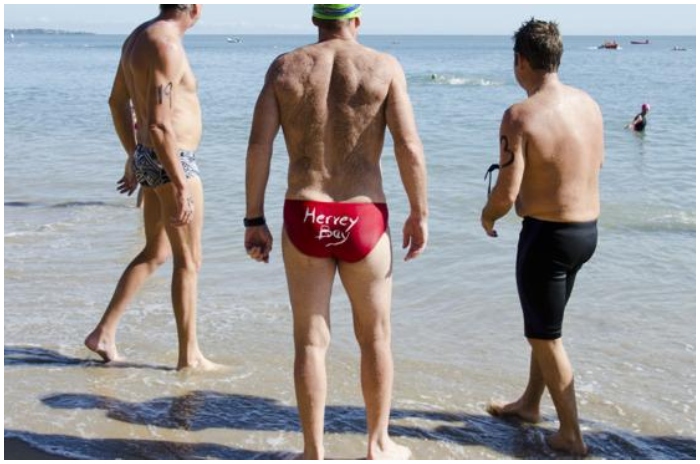Planet Earth is a melting pot of traditions, cultures, and yes—laws. While some laws are the backbone of any well-functioning society, others can leave us in disbelief. But don’t laugh off these peculiar regulations; ignorance of the law is no excuse, especially when you’re thousands of miles away from home!
From jaw-dropping to just plain bizarre, we’ve scoured the globe to bring you a collection of unusual laws that must be read to be believed. Trust us, you won’t want to be caught on the wrong side of these legal oddities while globetrotting. These 30 laws are so weird you’ll think we made them up.
You Must Honk When Passing a Car in New Jersey
Suppose you find yourself driving on a highway in New Jersey. In that case, you’d better remember to honk your horn before passing another vehicle. Yes, you read that right! The Garden State has a law that requires drivers to signal audibly when overtaking another car.

This applies whether you’re on the infamous Garden State Parkway or the New Jersey Turnpike. While this might seem like an unnecessary addition to the already noisy streets of Jersey, the law insists on it to ensure road safety.
It’s Illegal to Reincarnate Without Permission in China
In China, Tibetan Buddhist monks are confronted with a peculiar legal obstacle: they must obtain permission from the government to reincarnate. This law is part of a broader framework of religious control. It is primarily seen as a way for the Chinese government to assert its influence over Tibetan Buddhism.

While the enforcement logistics are puzzling, to say the least, the existence of such a law underscores the extent of control that the government seeks over spiritual matters, including the cycle of birth, death, and rebirth.
Registering as Married at a Hotel Makes It So in North Carolina
Walking into a hotel and registering as a married couple in North Carolina effectively makes you legally married! Under the state’s common law marriage rules, presenting yourself “outwardly” as husband and wife establishes a legal marriage.

So, the next time you’re checking into a hotel in North Carolina, be clear about your relationship status—unless you’re looking for an unplanned wedding ceremony.
Canadian Radio Stations Must Play Canadian Artists
What’s that sound? Oh, just another Canadian artist blessing the Canadian airwaves. By law, radio stations must play at least 35% of tunes by homegrown talent between 6 a.m. and 6 p.m., Monday to Friday.

This policy assures you’ll be serenaded by the likes of Nickelback, Alanis Morissette, Celine Dion, Michael Bublé, and yes, the Biebs himself. Patriotic much? It’s a harmonious way to keep Canadian culture alive and kickin’!
It’s Illegal to Run Out of Gas on the German Autobhan
Love the thrill of flooring the gas pedal? Germany’s Autobahn is your mecca. But don’t let the excitement blind you; running out of gas is not just embarrassing, it’s illegal! Germans hold you responsible for keeping that tank full.

Stall out, and you’re looking at a hefty fine. Consider walking to the nearest gas station. Bad idea—you’ll get fined for that, too! The moral of the story: Keep that gas gauge in check!
It’s Illegal to Hike Naked in Switzerland
Who would have thought hiking could be scandalous? About a decade ago, Swiss and German tourists took to the Swiss woods sans clothing, and Swiss officials had to intervene. Yes, public indecency laws exist even in the tranquility of Switzerland’s forests.

In 2011, one daring Swiss man faced a $100 fine for his cheeky escapade. So, if you’re contemplating a nude hike, just don’t—unless you’re prepared to pay the price!
It’s Illegal to Feed Pigeons in Venice, Italy
Venice: a city of romance, canals, and…pigeons? Lots of them, especially at Saint Mark’s Square. Before 2008, tourists would feed them freely, leading to Instagram-worthy photos and an expensive clean-up. Each Venetian shouldered a €275 annual burden, so the city declared feeding these winged residents illegal.

If you’re caught playing pigeon feeder, fines could soar up to €700. Capture the city’s architectural beauty instead; it’s a less expensive snapshot!
It’s Illegal to Wear High Heels to the Acropolis
In 2009, Greece made it crystal clear: leave your stilettos at home when visiting the Acropolis. While you might wonder who would dare trek around ancient ruins in high heels, the ban exists to protect the nearly 2,500-year-old site from potential damage.

The sharp points on high heels can be ruinous—literally. So, pack wisely. Opt for comfortable, soft-soled shoes and keep the towering footwear for Athens’ vibrant nightlife.
Don’t Wear Your Winnie the Pooh T-Shirt in Poland
Planning a family trip to Poland? You might want to leave those adorable Winnie the Pooh T-shirts at home. In a somewhat quirky move, Poland decided that the charming pants-less bear is too scandalous to be worn around playgrounds and schools.

Why? Because Pooh doesn’t wear pants, of course! Apparently, the A.A. Milne character is too risqué for impressionable young minds in Poland. When in doubt, opt for something less “controversial” for your child’s wardrobe in this Eastern European country.
Men Must Wear Speedos on French Beaches
If you’re jetting off to France for beach fun, prepare for serious swimwear scrutiny. French law stipulates that men must ditch their loose-fitting trunks in favor of—brace yourself—Speedos.

The thinking? If a man is wearing a Speedo, it’s less likely to be dirty compared to something he’s been lounging in all day. And if you think you’ll just throw a T-shirt on instead, think again. Those are banned, too. France takes pool hygiene to a whole new level!
It Is Illegal to Wear a Suit of Armor in British Parliament
Next time you’re in London, you might want to re-think your outfit for a visit to Parliament—especially if it involves a suit of armor. Though the law dates back to 1313, donning armor is a serious no-no.

Is it out of date? Probably. Will it be repealed? Unlikely. Let’s face it: armor might have been the go-to attire in the Middle Ages, but these days, it’s less House of Lords, more House of Fashion faux pas.
It’s Illegal to Ride a Cow While Drunk in Scotland
Scotland: land of whisky, kilts, and—wait for it—sober cow riding? It might sound like something out of a farcical movie. Still, an 1872 law prohibits you from being drunk while in charge of a cow, horse, carriage, or steam engine.

The law also wisely prohibits carrying a loaded firearm while intoxicated. It’s a unique blend of common sense and sheer absurdity, making Scotland’s legal landscape as fascinating as its natural one.
It’s Illegal to Wear Camouflage in (Much of) the Caribbean
Are you heading to a Caribbean paradise like Barbados, St. Vincent, or Jamaica? Ditch the camo! Many island nations ban camouflage clothing for everyone except military personnel.

Try wearing a camo tank or pants, and you might just be embroiled in a real fashion emergency. Why? It’s reserved for military use only, and wearing it is seen as an impersonation of officials. So, stick to floral prints and solid colors for that Caribbean getaway.
No Selfies With Buddha in Sri Lanka
Ready for some spiritual selfies in Sri Lanka? Hold that camera! Taking a selfie with a Buddha statue is a cultural no-no and can land you in jail. In Sri Lanka, turning your back on Buddha is seen as a disrespectful act. That’s not all—pointing fingers at the statues or ignoring “no photograph” signs is also frowned upon.

Though Buddha tattoos aren’t strictly illegal, they’re susceptible; a British woman was jailed for inappropriate Buddha ink in 2014. So be cautious and treat the sacred with the respect it deserves.
It’s Illegal to Wear a Mask in Public in Denmark
In Denmark, wearing a mask or any form of face covering in public isn’t just frowned upon—it’s illegal. Enacted in August 2018, the law prohibits hats, helmets, scarves, and even fake beards.

Burkas are also included in the list. The controversial legislation aims to help authorities easily identify individuals in crowded spaces, especially during emergencies or security situations. So, if you plan to roam the streets of Copenhagen, make sure your face is visible.
It’s Illegal to Fly a Kite in Victoria, Australia
Imagine a perfect day in Victoria, Australia; the sun is shining, and you’re in the mood to fly a kite. Be careful, though. According to the Summary Offences Act of 1966, kite flying in a public space is illegal if it causes annoyance to someone else.

Even engaging in a public game could land you in trouble if it irritates another person. While the rule is rarely enforced, it’s worth noting if you plan to indulge in some high-flying fun while exploring Melbourne or other parts of Victoria.
Mississippi’s “One for the Road” Loophole
Mississippi is often cited as the only U.S. state where it’s legal to drive while consuming an alcoholic beverage, provided the driver’s blood alcohol concentration stays under the legal limit of .08%. While many people find this law to be shocking, it’s important to note that Mississippi still enforces strict DUI laws and penalties for those who exceed the limit.

However, the allowance for so-called “open container” driving is indeed an anomaly in the United States, where most states have outright bans on consuming alcohol while operating a motor vehicle.
The Napoleon Pig Law: Truth or Myth?
There’s a long-standing rumor that naming a pig “Napoleon” is illegal in France. The tale has captured the imagination of many, serving as a quirky example of bizarre laws. However, upon further investigation, it appears that this “law” might be more of an urban myth than a legal reality.

No official documentation supports the claim that such a restriction exists. The myth likely gained traction due to the complex legacy of Napoleon Bonaparte, a pivotal figure in French history. While it makes for an amusing anecdote, this peculiar “law” seems to be more fiction than fact.
Flying a Kite Is Also Illegal in Buenos Aires, Argentina
Buenos Aires is known for its vibrant culture, tango music, and…a peculiar kite-flying ban. Believe it or not, the city outlawed this innocent pastime back in 1907. While the ban was partially lifted in 1989, allowing kite-flying in parks and squares, it remains a limited activity elsewhere.

You could face a penalty if you’re caught flying a kite outside these designated areas. So, if you’re visiting Argentina’s capital, it might be best to leave your kite-flying ambitions at home.
No Water Pistols on New Year’s in Cambodia
New Year’s Eve in Cambodia is a massive celebration, but one item is conspicuously absent—water pistols. Particularly in Siam Reap, authorities put a ban on the sale of water guns leading up to and during the New Year festivities.

Introduced to prevent potential “traffic accidents” and to maintain “public order,” this ban is only active during the New Year period. If you find yourself in Cambodia at this time, it is better to focus on the fireworks and traditional festivities.
It’s Illegal to Be Shirtless in Barcelona
The fashion police in Barcelona have legal backing! Since 2011, walking around the streets in your beachwear has been unlawful—no shirts or swimsuits allowed except near the beach or pools. This isn’t just a cultural norm; it’s a law that could land you a fine of up to €260.

So before you decide to walk from the beach to one of Barcelona’s many landmarks, make sure to change into more suitable attire to avoid any legal trouble.
It’s Illegal to Swear in the U.A.E.
If you’re visiting the United Arab Emirates, be sure to mind your language. Article 373 of the UAE Penal Code states that swearing “disgraces the honor or modesty of a person.” This isn’t just restricted to spoken words; even inappropriate gestures, text messages, and social media posts can land you in trouble.

A British man learned this the hard way when he was threatened with three weeks in jail for sending an angry message to a car dealer. Tread carefully with your words in the UAE.
It’s Illegal to Wear Lacy Undies in Russia
Are you planning on wearing lace underwear in Russia? Think again. A law passed 2014 in Russia, Belarus, and Kazakhstan mandates that undergarments must contain at least 6% cotton.

This bizarre rule was enacted for “health and safety” reasons. Despite protests from women across these countries, the law remains in force. However, how the authorities plan on checking compliance remains a mystery.
It’s Illegal to Dance in the Dark After Midnight in Japan
Dancing after midnight in Japan was long considered an activity too “sinful” or “too American” to allow. The law dates back to 1948, when US soldiers occupied Japan, and was originally intended to prevent the American way of life from corrupting Japan’s morals.

However, the dance ban was lifted in 2015, now permitting this form of expression after midnight. But there’s a catch — you must dance in well-lit venues. So, if you’re planning to hit the clubs in Tokyo or Osaka, ensure the lights are bright enough to keep you on the right side of the law.
You Must Hang Artwork in Wyoming Buildings
In the state of Wyoming, an intriguing rule requires any new public building to display artwork valued at a minimum of 1% of the building’s total construction costs. However, the amount can’t exceed $100,000. This law emphasizes Wyoming’s commitment to integrating the arts into public life.

While some may argue that this makes construction projects more complex, proponents believe it enriches community spaces. Remember, your hastily sketched doodle on a Post-It note will not pass muster; the art must be officially approved.
You Cannot Die Without a Pre-Purchased Burial Plot in Part of France
In Sarpourenx, a quaint town in France, a rather unusual law prevents residents from dying within the town’s limits unless they’ve already secured a burial plot in the local cemetery. This ordinance was implemented in 2008 due to a lack of space in the cemetery.

The mayor took it upon himself to issue this law and warned that violators would be “severely punished.” While it’s unclear how the town enforces this, the law certainly brings a new meaning to “rest in peace.”
You Must Walk Your Dog Daily in Rome
The city of Rome takes animal welfare quite seriously. So seriously, in fact, that there’s a law mandating dog owners to walk their dogs at least once a day. Failure to do so can result in a hefty fine of $625. But it’s not just dogs that are protected by Rome’s animal welfare laws; goldfish are included, too.

They can’t be kept in bowls but must be housed in a full-sized aquarium. This law reflects Rome’s broader commitment to animal well-being, ensuring that pets and even fish have room to move.
It’s Illegal to Build a Sandcastle in Spain
Imagine you’re vacationing in Spain, enjoying the sunny beaches, and you decide to build a sandcastle. Be cautious; this seemingly innocent activity could get you fined! Different regions have different penalty rates;

While Majorca might slap you with a €100 fine, Galicia could make you pay up to €1,500. It’s worth noting that children are not exempt from this restriction; parents will have to foot the bill for their little architects.
Capri May Bust Your Dog With DNA
The island of Capri in Italy has gone high-tech when it comes to enforcing its dog waste laws. Not only is it illegal to leave your dog’s waste behind, but authorities have also instituted DNA testing mechanisms to catch irresponsible pet owners.

Imagine a future where you could be fined based on the DNA of the poop your dog leaves behind. This measure emphasizes the seriousness with which Capri treats public cleanliness and environmental responsibility.
It’s Illegal to Kill Bigfoot in British Columbia, Canada
The mythical creature Bigfoot, also known as Sasquatch, has been “spotted” numerous times since the 1800s. While there’s no definitive proof of its existence, lawmakers in British Columbia still need to pass legislation to protect it.

Killing Bigfoot in this Canadian province without a proper hunting license could lead to a fine of up to $250,000. Interestingly, Washington State in the US has a similar law to protect the elusive creature.
It’s Illegal to Chew Gum in Singapore
Ah, the sweet taste of freedom, but not in Singapore when it comes to chewing gum! Established in 1992, Singapore’s iconic ban on gum was rooted in a pretty sticky situation. Vandalism involving gum in the Mass Rapid Transit system and a staggering $150,000 annual clean-up bill led the nation to implement the ban.

Nowadays, forget about importing, selling, or even making gum in the country; you’re looking at steep fines and potential jail time. However, nicotine and dental gums offering therapeutic benefits are the sole exceptions. Better ditch the gum before you touch down in Singapore!
It’s Illegal to Pee in the Ocean in Portugal
Portugal takes the cleanliness of its beaches very seriously. So much so that it’s illegal to urinate in the ocean. While this may seem like a complex law to enforce, it underscores the lengths to which the country will go to maintain its natural beauty.

The prohibition exists to maintain hygiene standards and ensure the well-being of all beachgoers. So, if you’re planning a day at the beach in Portugal, it’s advised to make use of the public restrooms available.